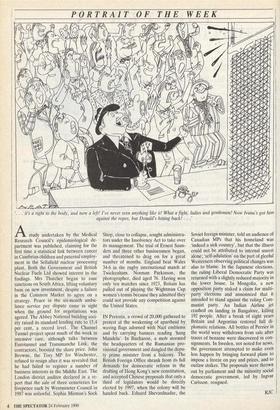PORTRAIT OF THE WEEK
' . . it's a right to the body, and now a left! I've never seen anything like it! What a fight, ladies and gentlemen! Now Ivana's got him against the ropes, but Donald's hitting back!. .
Astudy undertaken by the Medical Research Council's epidemiological de- partment was published, claiming for the first time a statistical link between cancer in Cumbrian children and paternal employ- ment in the Sellafield nuclear processing plant. Both the Government and British Nuclear Fuels Ltd showed interest in the findings. Mrs Thatcher began to ease sanctions on South Africa, lifting voluntary bans on new investment, despite a failure in the Common Market to agree on a strategy. Peace in the six-month ambu- lance service pay dispute came in sight when the ground for negotiations was agreed. The Abbey National building soci- ety raised its standard lending rate to 15.4 per cent, a record level. The Channel Tunnel project spent much of the week in intensive care, although talks between Eurotunnel and Transmanche Link, the contractors, boosted the share price. John Browne, the Tory MP for Winchester, refused to resign after it was revealed that he had failed to register a number of business interests in the Middle East. The London district auditor declared in a re- port that the sale of three cemeteries for fivepence each by Westminster Council in 1987 was unlawful. Sophie Mirman's Sock
Shop, close to collapse, sought administra- tors under the Insolvency Act to take over its management. The trial of Ernest Saun- ders and three other businessmen began, and threatened to drag on for a great number of months. England beat Wales 34-6 in the rugby international match at Twickenham. Norman Parkinson, the photographer, died aged 76. Having won only ten matches since 1923, Britain has pulled out of playing the Wightman Cup women's tennis because they admitted they could not provide any competition against the United States.
IN Pretoria, a crowd of 20,000 gathered to protest at the weakening of apartheid by waving flags adorned with Nazi emblems and by carrying banners reading 'hang Mandela'. In Bucharest, a mob stormed the headquarters of the Rumanian pro- visional government and dangled the depu- ty prime minister from a balcony. The British Foreign Office shrank from its full demands for democratic reform in the drafting of Hong Kong's new constitution, and accepted Chinese proposals that only a third of legislators would be directly elected by 1997, when the colony will be handed back. Eduard Shevardnadze, the Soviet foreign minister, told an audience of Canadian MPs that his homeland was 'indeed a sick country', but that the illness could not be attributed to internal unrest alone; 'self-adulation' on the part of gleeful Westerners observing political changes was also to blame. In the Japanese elections, the ruling Liberal Democratic Party was returned with a slightly reduced majority in the lower house. In Mongolia, a new opposition party staked a claim for multi- party elections and announced that it intended to stand against the ruling Com- munist party. An Indian Airline jet crashed on landing in Bangalore, killing 192 people. After a break of eight years Britain and Argentina restored full di- plomatic relations. All bottles of Perrier in the world were withdrawn from sale after traces of benzene were discovered in con- signments. In Sweden, not noted for news, the government attempted to make even less happen by bringing forward plans to impose a freeze on pay and prices, and to outlaw strikes. The proposals were thrown out by parliament and the minority social democratic government, led by Ingvar Carlsson, resigned.
RJC


















































 Previous page
Previous page